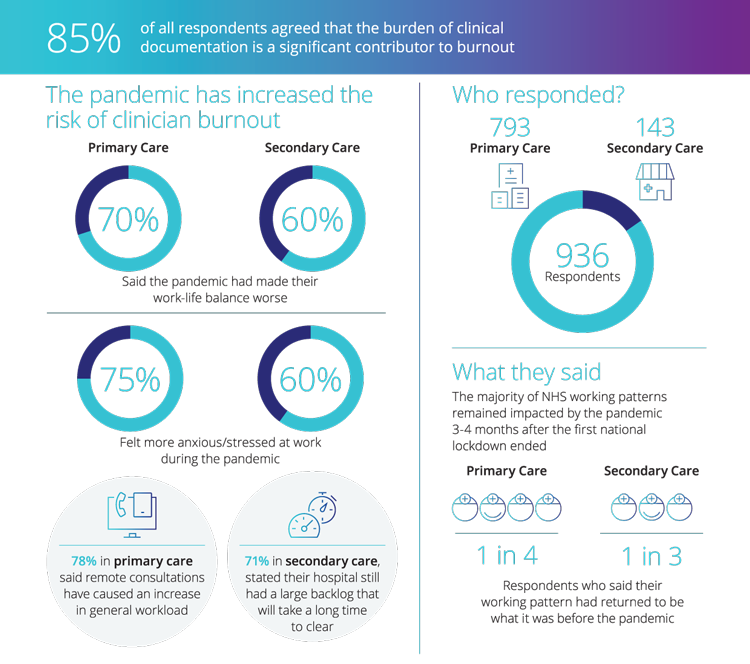
Dr Simon Wallace
Chief Clinical Information Officer (CCIO), Nuance Communications
AI-powered speech recognition is dramatically cutting the time clinicians spend doing their documentation, freeing them up to spend more time on patient care.
With growing evidence showing that admin is adding to workload and clinician burnout, speech recognition tools harnessing artificial intelligence (AI) are helping ease that burden.
Dr Simon Wallace, Chief Clinical Information Officer with Nuance Communications, says: “Healthcare has become increasingly complex. That requires detailed documentation so that clinicians have an accurate record, not just for themselves but for other clinicians looking after patients.”
Risk of burnout
Yet it is an ever more time-consuming process. A survey by the company indicated clinicians were spending 11 hours a week creating their documentation. Other research has suggested using an Electronic Patient Record, adds a further 30-40 minutes to the clinician’s working day.
Dr Wallace says: “This has resulted in doctors only spending an estimated 13% of their day with patients; they are overwhelmed by clinical documentation, adding to stress and issues of burnout.”
COVID-19, inevitably, has added to that.
Last September, Nuance surveyed 900 NHS clinicians and managers from primary and secondary care. A high proportion stated clinical administration had increased during the pandemic and that their work-life balance and stress at work had worsened.
Significantly, 87% in primary care and 70% in secondary care thought the burden of clinical documentation had contributed to burnout.
Dragon Medical One has helped our staff pivot to remote working due to coronavirus. As a cloud-based solution it’s playing a vital role in supporting our doctors conducting clinics from home.
Dr Paul Altmann
Chief Clinical Information Officer, Oxford University Hospitals NHS Foundation Trust
Highly accurate speech recognition
Speech recognition systems can be used anywhere that clinicians are typing or dictating documents.
Sophisticated algorithms and deep learning, supported by a comprehensive medical dictionary, deliver “industrial strength” accuracy, with the system attuned to different accents and languages.
This has resulted in doctors only spending an estimated 13% of their day with patients; they are overwhelmed by clinical documentation, adding to stress and issues of burnout.
Speech recognition is commonly used in radiology but is now being widely adopted in other clinical areas of the hospital, as well as in mental health, the community and primary care. In the hospital setting, major benefits in A&E and outpatient departments have been realised.
Dr Wallace adds: “Some organisations were having high outsourced transcription costs, others had a shortage of secretaries and were relying on bank staff, and clinicians were staying late to get their admin done.”
Admin burden reduced
With speech recognition, the turnaround time of clinic letters dropped from two to three weeks, to two to three days
“Clinicians felt their admin burden was reduced, transcription costs were significantly reduced and the burden on secretaries eased,” he continues. “That has been a real success in the outpatient department with hospitals getting a healthy return on investment.”
Dragon Medical One has had a big impact on the efficiency of getting our letters done for any clinic. Clinicians are now able to send letters within 24 hours—or even instantaneously if there are no blood results to be waited upon. This compares with the pre‑speech recognition era where letters took 2 weeks or even longer to be completed.
Dr Paul Altmann
Chief Clinical Information Officer, Oxford University Hospitals NHS Foundation TrustClinic room of the future
Looking ahead, AI speech recognition technology is a foundation for other solutions aiding clinician workflow and easing administrative burden. Using natural language processing (NLP), the quality of a clinical term can be improved, clinicians alerted to possible missing diagnoses and clinical terms coded (e.g. with SNOMED CT codes).
The ultimate vision is the clinic room of the future using ‘ambient clinical intelligence’. The desktop computer is replaced with a ‘smart device’ on the wall that harnesses voice biometrics to diarise the whole conversation between the doctor and the patient. NLP works in the background to create a fully structured, coded clinical note without the clinician needing to touch the keyboard at all.
Nuance is the creator of Dragon Medical One.


